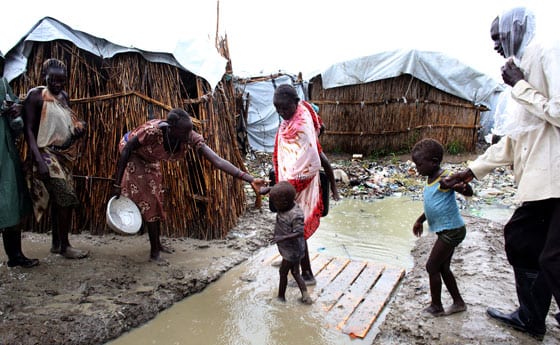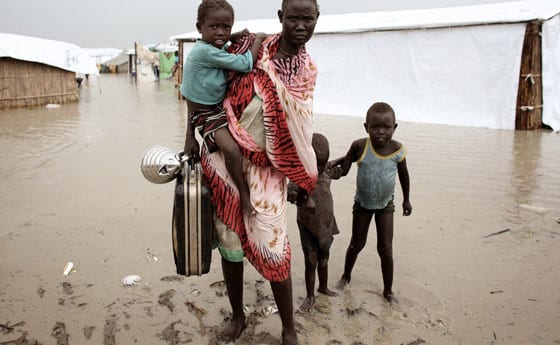Last week, I was scared of getting stuck. Not in traffic, not in the office — but in Bentiu. Where? Bentiu, a small town in South Sudan. A town that has experienced drastic fighting and horrific massacres in the past six months. A town where approximately 50,000 people have fled to the United Nations peacekeeper compound. And that’s exactly where I feared being trapped.
It was raining all night. And when it rains the airstrip floods and is transformed into a lane of red, sticky mud. The tiny white Cessna planes can’t land anymore as they would get ripped apart by the glue-like sludge.
When I opened the door of my sleeping area in the early morning, rain still fell silently from the dark grey sky. It subdued all sounds. Besides the soft dripping from the roof, I only heard the squeaky cries of a mongoose family rushing by. They were on the hunt for snakes, sniffing under the elevated container floors. Cobras, Black Mambas; the aid worker compound is shared by humans and serpents alike.
As the sun rose it gave way to a grim sight. Everything was flooded. The mud was shinbone-deep. No movement was possible without gum boots. I brushed my teeth at the filthy toilet box, or ablution as it’s called in the UN official language, staring gloomily at the couple of brown bugs which found their death overnight in the drowned sink. I thought I could not handle the terrible conditions any longer. The mud. The polluted toilets. The vultures sitting on top of the compound lamps.
Then I looked around me and realised that there are about 50,000 people who do not have the luxury of leaving. People who came to the UN camp to seek safety. People who only venture out to search for firewood and food. (And then it’s mainly women who do that job because they ‘only’ get raped instead of being downright killed.) Many people who sought shelter here lost family members, friends, colleagues in the fighting that started last December. They might be safe from the violence for now, but they are in stark danger of diseases, trauma, and violence.
As we walked through the camp, faeces swam by my ankles. CARE has been operating two clinics in Bentiu, and diarrhoea is a major health issue even in dry days. Other parts of South Sudan have already reported an outbreak of cholera. In Bentiu, we have been building a cholera treatment centre as a precaution. I worry that after all this rain precaution will transform into reality. Our nutrition centre was flooded, meaning malnourished children and their mothers did not get any support that day.
That’s how I got over my moment of self-pity. I stayed only two days. The displaced families have been here for months — and no one knows right now how long they will be stuck in Bentiu.
While I was finally able to leave on a helicopter, my colleagues stayed behind. I can’t even begin to express my deep admiration for CARE staff and all other aid workers who are out there every day. They race against time to avoid the outbreak of diseases; to help malnourished children; and to vaccinate, bandage, consult and treat sick people. They are there to make the terrible living conditions somewhat inhabitable.
For more information or to donate to CARE Australia’s South Sudan Emergency Appeal, see www.care.org.au



